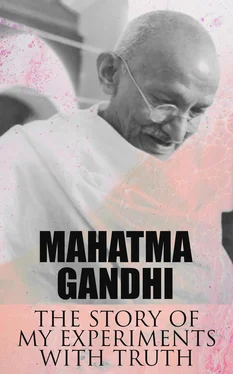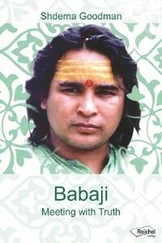Mahatma Gandhi - The Story of My Experiments with Truth
Здесь есть возможность читать онлайн «Mahatma Gandhi - The Story of My Experiments with Truth» — ознакомительный отрывок электронной книги совершенно бесплатно, а после прочтения отрывка купить полную версию. В некоторых случаях можно слушать аудио, скачать через торрент в формате fb2 и присутствует краткое содержание. Жанр: unrecognised, на английском языке. Описание произведения, (предисловие) а так же отзывы посетителей доступны на портале библиотеки ЛибКат.
- Название:The Story of My Experiments with Truth
- Автор:
- Жанр:
- Год:неизвестен
- ISBN:нет данных
- Рейтинг книги:5 / 5. Голосов: 1
-
Избранное:Добавить в избранное
- Отзывы:
-
Ваша оценка:
- 100
- 1
- 2
- 3
- 4
- 5
The Story of My Experiments with Truth: краткое содержание, описание и аннотация
Предлагаем к чтению аннотацию, описание, краткое содержание или предисловие (зависит от того, что написал сам автор книги «The Story of My Experiments with Truth»). Если вы не нашли необходимую информацию о книге — напишите в комментариях, мы постараемся отыскать её.
The Story of My Experiments with Truth — читать онлайн ознакомительный отрывок
Ниже представлен текст книги, разбитый по страницам. Система сохранения места последней прочитанной страницы, позволяет с удобством читать онлайн бесплатно книгу «The Story of My Experiments with Truth», без необходимости каждый раз заново искать на чём Вы остановились. Поставьте закладку, и сможете в любой момент перейти на страницу, на которой закончили чтение.
Интервал:
Закладка:
I was elected to the Executive Committee of the Vegetarian Society, and made it a point to attend every one of its meetings, but I always felt tongue-tied. Dr. Oldfield once said to me, ‘You talk to me quite all right, but why is it that you never open your lips at a committee meeting? You are a drone.’ I appreciated the banter. The bees are ever busy, the drone is a thorough idler. And it was not a little curious that whilst others expressed their opinions at these meetings, I sat quite silent. Not that I never felt tempted to speak. But I was at a loss to know how to express myself. All the rest of the members appeared to me to be better informed than I. Then it often happened that just when I had mustered up courage to speak, a fresh subject would be started. This went on for a long time.
Meantime a serious question came up for discussion. I thought it wrong to be absent, and felt it cowardice to register a silent vote. The discussion arose somewhat in this wise. The President of the Society was Mr. Hills, proprietor of the Thames Iron Works. He was a puritan. It may be said that the existence of the Society depended practically on his financial assistance. Many members of the Committee were more or less his proteges. Dr. Allinson of vegetarian fame was also a member of the Committee. He was an advocate of the then new birth control movement, and preached its methods among the working classes. Mr. Hills regarded these methods as cutting at the root of morals. He thought that the Vegetarian Society had for its object not only dietetic but also moral reform, and that a man of Dr. Allinson’s anti-puritanic views should not be allowed to remain in the Society. A motion was therefore brought for his removal. The quest-tion deeply interested me. I considered Dr. Allinson’s views regarding artificial methods of birth control as dangerous, and I believed that Mr. Hills was entitled, as a puritan, to oppose him. I had also high regard for Mr. Hills and his generosity. But I thought it was quite improper to exclude a man from a vegetarian society simply because he refused to regard puritan morals as one of the objects of the society. Mr. Hills’ view regarding the exclusion of anti-puritans from the Society was personal to himself, and it had nothing to do with the declared object of the Society, which was simply the promotion of vegetarianism and not of any system of morality. I therefore held that any vegetarian could be a member of the Society irrespective of his views on other morals.
There were in the Committee others also who shared my view, but I felt myself personally called upon to express my own. How to do it was the question. I had not the courage to speak and I therefore decided to set down my thoughts in writing. I went to the meeting with the document in my pocket. So far as I recollect, I did not find myself equal even to reading it, and the President had it read by someone else. Dr. Allinson lost the day. Thus in the very first battle of the kind I found myself siding with the losing party. But I had comfort in the thought that the cause was right. I have a faint recollection that, after this incident, I resigned from the Committee.
This shyness I retained throughout my stay in England. Even when I paid a social call the presence of half a dozen or more people would strike me dumb.
I once went to Ventnor with Sjt. Mazmudar. We stayed there with a vegetarian family. Mr. Howard, the author of The Ethics of Diet, was also staying at the same watering-place. We met him, and he invited us to speak at a meeting for the promotion of vegetarianism. I had ascertained that it was not considered incorrect to read one’s speech. I knew that many did so to express themselves coherently and briefly. To speak ex tempore would have been out of the question for me. I had therefore written down my speech. I stood up to read it, but could not. My vision became blurred and I trembled, though the speech hardly covered a sheet of foolscap. Sjt. Mazmudar had to read it for me. His own speech was of course excellent and was received with applause. I was ashamed of myself and sad at heart for my incapacity.
My last effort to make a public speech in England was on the eve of my departure for home. But this time too I only succeeded in making myself ridiculous. I invited my vegetarian friends to dinner in the Holborn Restaurant referred to in these chapters. ‘A vegetarian dinner could be had,’ I said to myself, ‘in vegetarian restaurants as a matter of course. But why should it not be possible in a non-vegetarian restaurant too?’ And I arranged with the manager of the Holborn Restaurant to provide a strictly vegetarian meal. The vegetarians hailed the new experiment with delight. All dinners are meant for enjoyment, but the West has developed the thing into an art. They are celebrated with great eclat, music and speeches. And the little dinner party that I gave was also not unaccompanied by some such display. Speeches, therefore, there had to be. When my turn for speaking came, I stood up to make a speech. I had with great care thought out one which would consist of a very few sentences. But I could not proceed beyond the first sentence. I had read of Addison that he began his maiden speech in the House of Commons, repeating ‘I conceive’ three times, and when he could proceed no further, a wag stood up and said ‘The gentleman conceived thrice but brought forth nothing.’ I had thought of making a humorous speech taking this anecdote as the text. I therefore began with it and stuck there. My memory entirely failed me and in attempting a humorous speech I made myself ridiculous. ‘I thank you, gentlemen, for having kindly responded to my invitation,’ I said abruptly, and sat down.
It was only in South Africa that I got over this shyness, though I never completely overcame it. It was impossible for me to speak impromptu. I hesitated whenever I had to face strange audiences and avoided making a speech whenever I could. Even today I do not think I could or would even be inclined to keep a meeting of friends engaged in idle talk.
I must say that, beyond occasionally exposing me to laughter, my constitutional shyness has been no disadvantage whatever. In fact I can see that, on the contrary, it has been all to my advantage. My hesitancy in speech, which was once an annoyance, is now a pleasure. Its greatest benefit has been that it has taught me the economy of words. I have naturally formed the habit of restraining my thoughts. And I can now give myself the certificate that a thoughtless word hardly ever escapes my tongue or pen. I do not recollect ever having had to regret anything in my speech or writing. I have thus been spared many a mishap and waste of time. Experience has taught me that silence is part of the spiritual discipline of a votary of truth. Proneness to exaggerate, to suppress or modify the truth, wittingly or unwittingly, is a natural weakness of man, and silence is necessary in order to surmount it. A man of few words will rarely be thoughtless in his speech; he will measure every word. We find so many people impatient to talk. There is no chairman of a meeting who is not pestered with notes for permission to speak. And whenever the permission is given the speaker generally exceeds the time-limit, asks for more time, and keeps on talking without permission. All this talking can hardly be said to be of any benefit to the world. It is so much waste of time. My shyness has been in reality my shield and buckler. It has allowed me to grow. It has helped me in my discernment of truth.
XIX THE CANKER OF UNTRUTH
Table of Contents
There were comparatively few Indian students in England forty years ago. It was a practice with them to affect the bachelor even though they might be married. School or college students in England are all bachelors, studies being regarded as incompatible with married life. We had that tradition in the good old days, a student then being invariably known as a brahmachari. 10But in these days we have child-marriages, a thing practically unknown in England. Indian youths in England, therefore, felt ashamed to confess that they were married. There was also another reason for dissembling, namely that in the event of the fact being known it would be impossible for the young men to go about or flirt with the young girls of the family in which they lived. The flirting was more or less innocent. Parents even encouraged it; and that sort of association between young men and young women may even be a necessity there, in view of the fact that every young man has to choose his mate. If, however, Indian youths, on arrival in England indulge in these relations, quite natural to English youths, the result is likely to be disastrous, as has often been found. I saw that our youths had succumbed to the temptation and chosen a life of untruth for the sake of companionships which, however innocent in the case of English youths, were for them undesirable. I too caught the contagion. I did not hesitate to pass myself off as a bachelor though I was married and the father of a son. But I was none the happier for being a dissembler. Only my reserve and my reticence saved me from going into deeper waters. If I did not talk, no girl would think it worth her while to enter into conversation with me or to go out with me.
Читать дальшеИнтервал:
Закладка:
Похожие книги на «The Story of My Experiments with Truth»
Представляем Вашему вниманию похожие книги на «The Story of My Experiments with Truth» списком для выбора. Мы отобрали схожую по названию и смыслу литературу в надежде предоставить читателям больше вариантов отыскать новые, интересные, ещё непрочитанные произведения.
Обсуждение, отзывы о книге «The Story of My Experiments with Truth» и просто собственные мнения читателей. Оставьте ваши комментарии, напишите, что Вы думаете о произведении, его смысле или главных героях. Укажите что конкретно понравилось, а что нет, и почему Вы так считаете.












